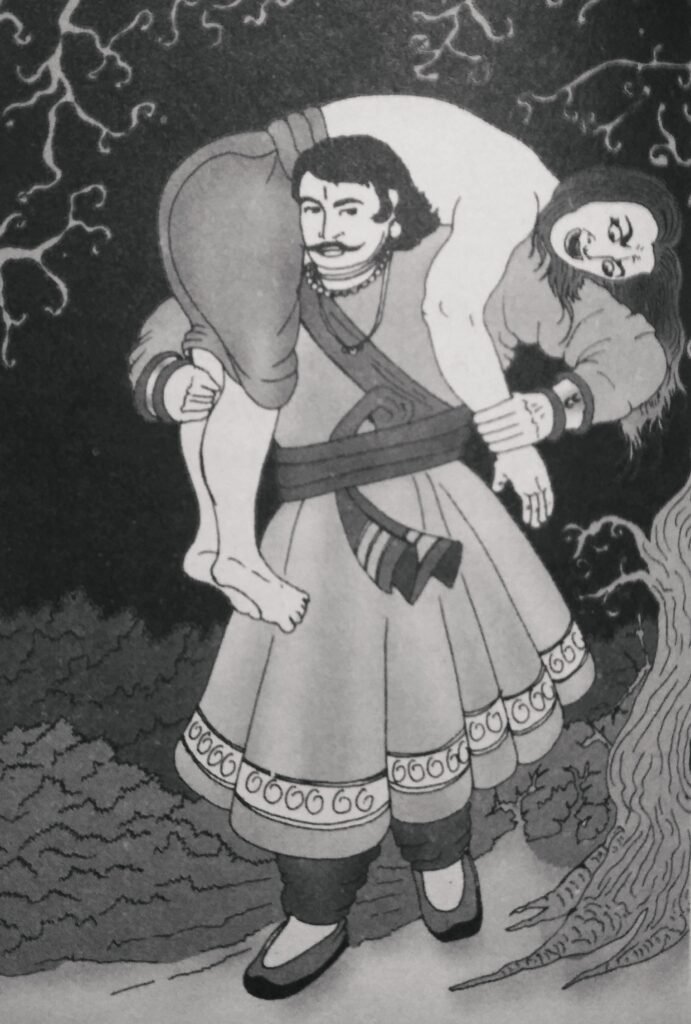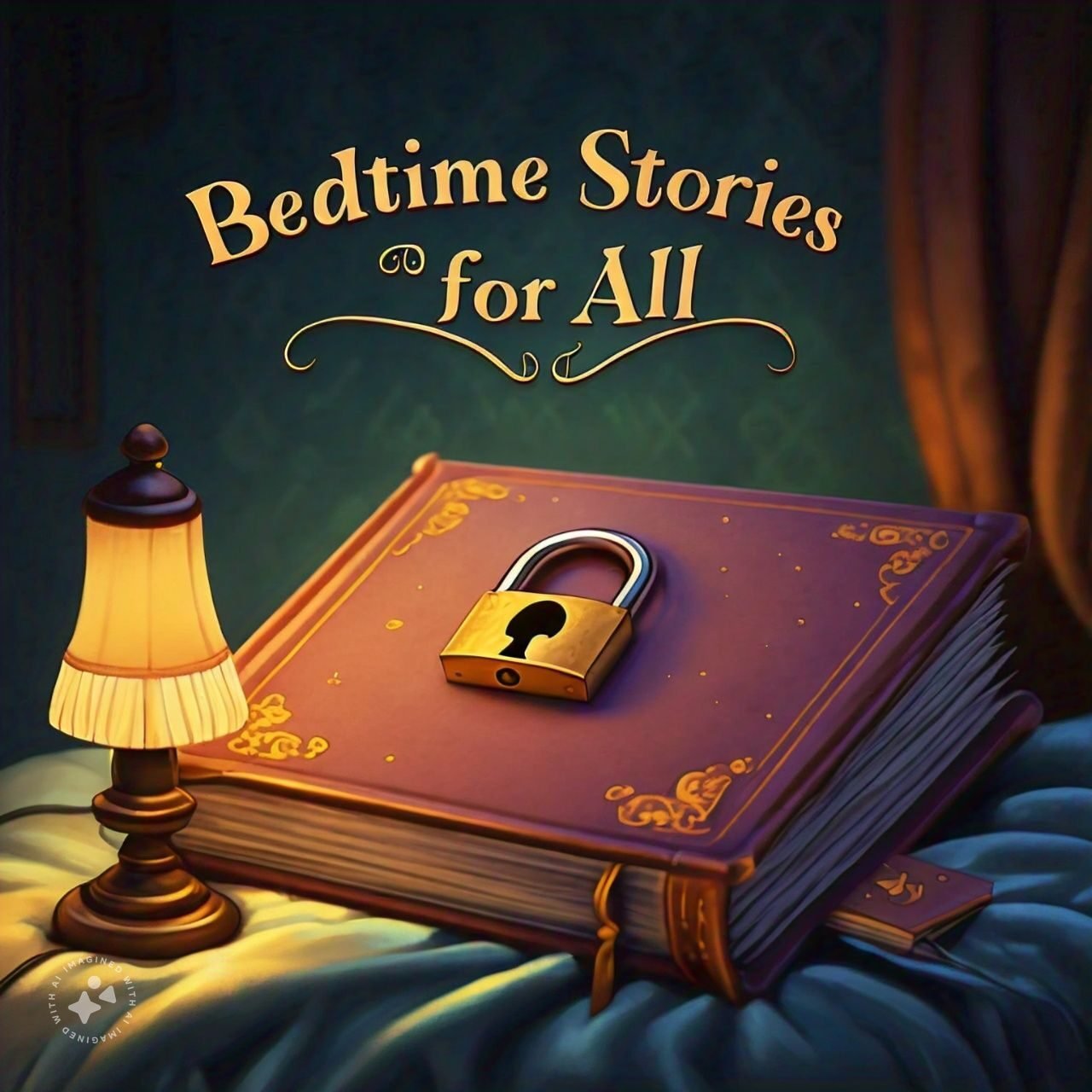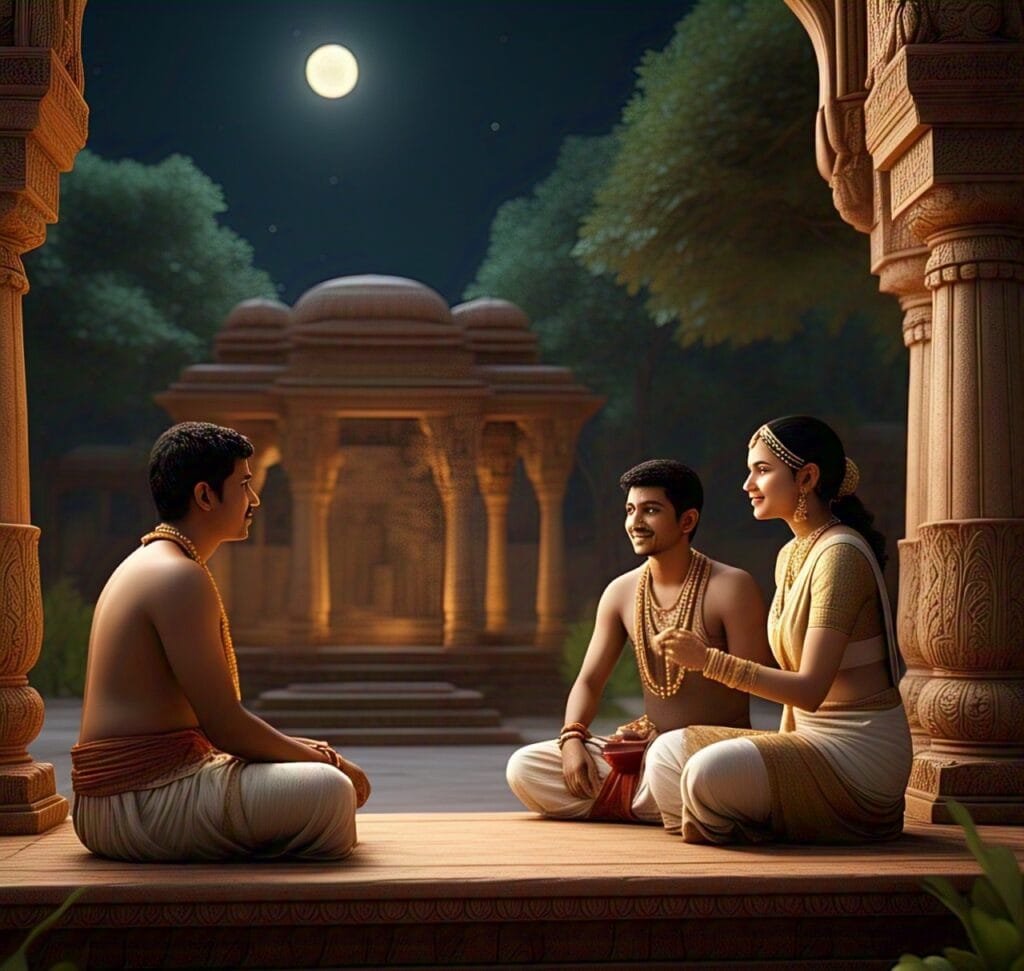King Vikramaditya returned to the peepal tree, where Betal hung upside down from a crooked branch. Without a word, he heaved Betal onto his shoulders and set off toward the crematorium, determined to keep his promise to the sage.
Betal, amused by the king’s endless patience and clever replies, finally said, “Vikram, enough silence—I free you. No more tricks this time. But since the crematorium is still distant, let me share one final story.” Though weary from Betal’s earlier escapes, Vikramaditya smiled, his resolve softening at the ghost’s unexpected sincerity.

Betal began his final tale:
In the ancient city of Kanyakubja—now called Kannauj—under the reign of the generous King Harshavardhana of the Vardhana Dynasty, there lived two brothers, Karan and Arjun. Though merely small-time merchants, they ran their business together, bound not just by trade but by unshakable brotherly love.
One day, the brothers journeyed to a distant land to sell their wares. Fortune favored them: their venture thrived, and they returned home with pockets heavy with profit. But as they set foot on the road back, fate had other plans…

As the brothers trekked through the dense forest, a piercing wail shattered the silence. Exchanging glances, Karan and Arjun followed the sound—their footsteps cautious against the rustling leaves. There, beneath the gnarled branches, sat a woman of striking beauty, her face streaked with tears.
“Who wrongs you, young lady?” asked Arjun, kneeling beside her.
Between sobs, she unraveled her tale: “Days ago, bandits ambushed my husband and me… They stole everything—my jewels, our coins—then cut him down before my eyes. Now I am alone, with no kin, no home… no hope.” Her voice trembled as she clutched her torn shawl.

The woman wept uncontrollably, her sorrow piercing the brothers’ hearts. Moved by her distress, Karan and Arjun knew they had to act. After a quiet discussion beneath the whispering trees, they arrived at a solution: one of them would marry her, offering her protection and a new life.
When they proposed this to the woman, she hesitated at first—but seeing the genuine concern in their eyes, she finally nodded in agreement. Their kindness had earned her trust.
Now came the delicate question: Which brother should marry her?
To decide fairly, they wrote their names on small chits of paper, folded them carefully, and laid them before the woman. All three agreed—whoever’s name she drew would become her husband. With trembling fingers, she picked one chit and unfolded it.
“Karan,” she read aloud.

And so, Karan wed the woman, and the three returned to their village together, beginning a new chapter of their lives.
Years rolled by, and their humble business blossomed beyond expectations. The brothers’ shared toil had transformed their small shop into a thriving enterprise, its name now respected in markets across the region. Through lean seasons and prosperous ones, they stood shoulder to shoulder.
Yet as their trade flourished, so did their individual dreams. The elder brother’s gaze turned toward distant markets and new ventures, while the younger found deeper satisfaction in perfecting their original craft. The unspoken understanding between them grew clearer with each passing month.
When the time came, their parting held no ceremony beyond a firm handshake – the same gesture that had sealed countless deals, now marking their gentle separation. Their hands lingered a moment longer than usual, calloused palms remembering years of shared labor. The division was fair, the accounts settled without dispute.

As they turned to their separate paths, the weight of that final handshake said what words couldn’t – gratitude for the past, and quiet hope for what each might build alone. The marketplace continued its bustle around them, unchanged by this quiet turning of their lives.
Time flowed like river water. Karan’s wife bore him a son – their home brimmed with joy at this new life.

But fate, ever fickle, soon darkened their doorstep. Before the boy could even speak properly, Karan succumbed to a raging fever that stole him within days.
His widow collapsed under the weight of grief, her mourning cries echoing through their home. Arjun found himself hollowed out – no longer just a business partner, but a man who’d lost half his soul.
The mourning period had barely ended when Karan’s widow stood at Arjun’s threshold, her infant son clinging to her waist. “Brother Arjun,” she began firmly, “I demand half of your property – not for greed, but for this child who carries your brother’s blood.” She lifted the boy higher. “This is his birthright before your future wife comes between us. Half now, or nothing later when new loyalties divide your heart.”

Arjun’s face darkened like a monsoon cloud. “Sister, this makes no sense! Our businesses were divided years ago with full settlement. What right have you to my property now?”
But she stood firm as the ancient peepal tree outside Arjun’s home. When reasoning failed, she marched to King Harshavardhana’s durbar, the child’s small hand clutched in hers.

The wise king observed them carefully – the widow’s determined stance, the child’s innocent eyes, Arjun’s agitated protests. After hearing both sides, Harshavardhana stroked his moustache thoughtfully. “The law knows property divisions,” he mused, “but Dharma knows deeper obligations…” (“धर्मार्थं व्यवस्था जानाति, परं कर्तव्यस्य गम्भीरतरं तत्त्वमस्ति…”)

Betal posed his riddle: “So tell me, Vikram – should the wise and judicious King Harshavardhana award half the property to the widow for her son’s future, or uphold the brothers’ past settlement?”
Dear Readers, what judgment do you think wise King Harshavardhana delivered in this matter? Take a moment to consider the arguments and make your guess before you read on to Vikramaditya’s response.

The Vikramaditya’s fingers paused over his beads. Justice demanded one path… but compassion whispered another.”
Betal’s eyes gleamed. “Now—wise king that you are—how would you rule?” asked Betal.
Vikramaditya thought for a while and then said, “The law is clear, Betal,” he began, “but dharma clearer still. When that woman stood between both brothers years ago, her fate—and her rights—were woven equally into their lives. She chose Karan, yes… but Arjun’s shared responsibility for her welfare didn’t vanish with their business split.”
King Vikram then leaned forward and said, “That boy is Karan’s legacy. Would we let technicalities orphan him twice? Half the property is hers by the debt of brotherhood—if not by ledger.”
Betal clapped his hands in appreciation. “Exactly!” he said. “Harshavardhana delivered the very same judgment: ‘Family bonds outweigh written contracts. Let the child inherit his father’s share through his mother’s courage.’”
Vikramaditya felt a flicker of doubt—would Betal escape again? But the ghost, sensing his unease, reassured him: “Vikram, my promise stands firm. I won’t abandon you now.”
For the first time in that long night, Vikram’s body and mind found relief. More than twenty times he had sprinted back to that peepal tree after answering Betal’s riddles; More than twenty times he’d carried the ghost anew. Now, as they walked in rare harmony toward the nearby crematorium, even the moon seemed to sigh with them.
For a better understanding of the Analysis of Vikram’s Judgement, read the text below this image:

- Focus on Original Agreement –
- Vikram correctly identifies that the widow’s claim stems from the initial joint business arrangement when she married Karan.
- Since the brothers were partners at the time of her marriage, she had a legitimate stake in their collective wealth.
- Equity Over Technicality –
- While the brothers later separated their businesses, Vikram prioritizes the spirit of the agreement (her equal claim at marriage) over the later division.
- This reflects a Dharma-based judgment (moral duty) rather than a purely transactional one.
- Consistency with Ancient Jurisprudence –
- In many traditional Indian legal systems, widows had inheritance rights, especially if they had no other support.
- Vikram’s ruling aligns with King Harshavardhana’s reputation as a just ruler who cared for the vulnerable.
- His answer is wise and compassionate, fitting the Vikram-Betal tradition where Dharma (righteousness) > strict legality.
- However, a modern legal perspective might debate whether the widow’s claim was absolute or negotiable.
- 14 Best Panchatantra stories in hindi
- 15 Best Children Stories in English from Panchatantra 2.0
- 16 Best Aesop's Fables in Hindi with moral lessons
- 17 Best Aesop's Fables with moral lessons for children
- Arabian Nights
- Author's Best Written Stories in English
- Author's Best Written Stories in Hindi
- Baital Pachisi बैताल पचीसी in Hindi
- Bedtime Stories for All
- Hindi Love Stories
- Love and Romance
- Vikram and Betal series: Riddle Solving Stories
You can join my WhatsApp Channel by clicking the link here



